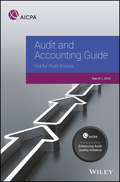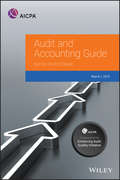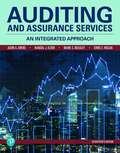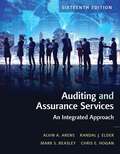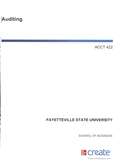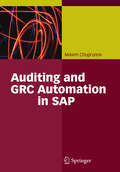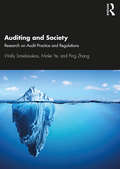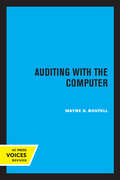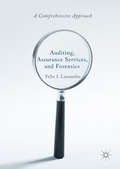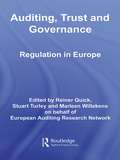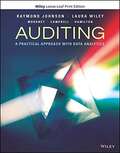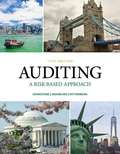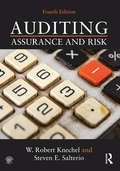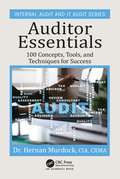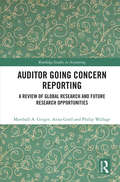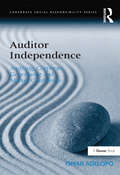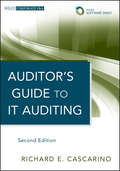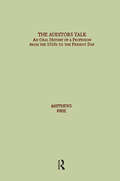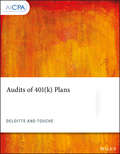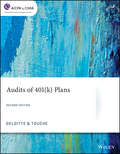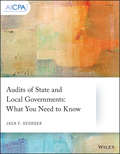- Table View
- List View
Auditing and Accounting Guide: Not-for-Profit Entities, 2017 (AICPA Audit and Accounting Guide)
by AicpaThis AICPA Accounting and Auditing Guide is a must-have for the resource libraries of accounting and auditing professionals who work with not-for-profit organizations. This essential reference book assists accountants in the unique aspects of accounting and financial statement preparation and auditing for not-for-profit entities. Created with common errors and questions in mind, accountants benefit from not-for-profit industry-specific guidance on the issues they are likely to encounter this year. The 2018 edition includes guidance on financial reporting changes, reporting donated services between affiliated NFPs, split-interest agreements, contributions and grants, functional expenses and joint costs, and much more. This new edition provides a comprehensive discussion of FASB ASU No. 2016-14, Not-for-Profit Entities (Topic 958): Presentation of Financial Statements of Not-for-Profit Entities. The discussion includes highlights of the changes that will assist financial statement preparers with implementing the standard. The guide offers dual guidance throughout, providing readers with the “before-and-after” context to enhance their understanding of the changes, as well as two all-inclusive appendices.
Auditing and Accounting Guide: Not-for-Profit Entities, 2019 (AICPA Audit and Accounting Guide)
by AICPAA must-have resource for accounting and auditing professionals who work with nonprofits, this essential reference will assist in the unique aspects of accounting and financial statement preparation and auditing for not-for-profit entities. Description: A must-have resource for new FASB guidance From financial reporting to revenue recognition to grants and contracts, you have a lot going on in the not-for-profit financial arena right now. Whether you're already an expert in NFP audit and accounting standards or just getting started, we’ve got the practical guidance you need. This must-have resource for nonprofits accounting and auditing professionals is an essential reference which will assist you with the unique aspects of accounting and financial statement preparation and auditing for not-for-profit entities. The 2019 guide will help you do the following: Understand and implement recent updates and changes, including those related to financial reporting, revenue recognition, and grants and contracts Gain a full understanding of the accounting issues unique to not-for-profit entities A must-have resource for accounting and auditing professionals who work with nonprofits, this essential reference will assist in the unique aspects of accounting and financial statement preparation and auditing for not-for-profit entities. Description: A must-have resource for new FASB guidance From financial reporting to revenue recognition to grants and contracts, you have a lot going on in the not-for-profit financial arena right now. Whether you're already an expert in NFP audit and accounting standards or just getting started, we’ve got the practical guidance you need. This must-have resource for nonprofits accounting and auditing professionals is an essential reference which will assist you with the unique aspects of accounting and financial statement preparation and auditing for not-for-profit entities. The 2019 guide will help you do the following: Understand and implement recent updates and changes, including those related to financial reporting, revenue recognition, and grants and contracts Gain a full understanding of the accounting issues unique to not-for-profit entities
Auditing and Assurance Services
by Alvin A. ArensAuditing and Assurance Services examines the process of conducting an audit from start to finish. The text's primary objective is to illustrate auditing concepts using practical examples and real-world settings. Using key real audit decisions as your foundation, you'll be able to successfully conduct an audit according to a financial reporting framework. The 17th Edition contains the latest standards and codes as well as new sample CPA-style questions to prepare you for the actual exam.
Auditing and Assurance Services (Sixteenth Edition)
by Alvin A. Arens Randal J. Elder Mark S. Beasley Chris E. HoganComprehensive and up-to-date, including discussion of new standards, codes, and concepts, Auditing and Assurance Services: An Integrated Approach presents an integrated concepts approach to auditing that details the process from start to finish. Based on the author's belief that the fundamental concepts of auditing center on the nature and amount of evidence that auditors should gather in specific engagements, this edition's primary objective is to illustrate auditing concepts using practical examples and real-world settings.
Auditing and Assurance Services: FSU Custom
by LouwersThe eighth edition of Auditing & Assurance Services continues its tradition as the most up-to-date auditing text on the market. All chapters and modules have been revised to incorporate <p><p>The latest professional standards, recodifications, and proposals from the Interna¬tional Auditing and Assurance Standards Board, Auditing Standards Board, and Public Company Accounting Oversight Board. <p><p>A list of the relevant professional standards that are covered in that chapter, including new AICPA reporting standards effective for 2020 fiscal years, as well as comprehensive coverage of the new PCAOB standards on auditing estimates.
Auditing and GRC Automation in SAP
by Maxim ChuprunovOver the last few years, financial statement scandals, cases of fraud and corruption, data protection violations, and other legal violations have led to numerous liability cases, damages claims, and losses of reputation. As a reaction to these developments, several regulations have been issued: Corporate Governance, the Sarbanes-Oxley Act, IFRS, Basel II and III, Solvency II and BilMoG, to name just a few. In this book, compliance is understood as the process, mapped not only in an internal control system, that is intended to guarantee conformity with legal requirements but also with internal policies and enterprise objectives (in particular, efficiency and profitability). The current literature primarily confines itself to mapping controls in SAP ERP and auditing SAP systems. Maxim Chuprunov not only addresses this subject but extends the aim of internal controls from legal compliance to include efficiency and profitability and then well beyond, because a basic understanding of the processes involved in IT-supported compliance management processes are not delivered along with the software. Starting with the requirements for compliance (Part I), he not only answers compliance-relevant questions in the form of an audit guide for an SAP ERP system and in the form of risks and control descriptions (Part II), but also shows how to automate the compliance management process based on SAP GRC (Part III). He thus addresses the current need for solutions for implementing an integrated GRC system in an organization, especially focusing on the continuous control monitoring topics. Maxim Chuprunov mainly targets compliance experts, auditors, SAP project managers and consultants responsible for GRC products as readers for his book. They will find indispensable information for their daily work from the first to the last page. In addition, MBA, management information system students as well as senior managers like CIOs and CFOs will find a wealth of valuable information on compliance in the SAP ERP environment, on GRC in general and its implementation in particular.
Auditing and Society: Research on Audit Practice and Regulations
by Ping Zhang Wally Smieliauskas Minlei YeAuditing has become an essential component in market societies and the need for auditing skills has risen in line with globalization. This textbook provides a comprehensive overview of the role of financial statement auditing in contemporary society, including the auditor’s role in evaluating the financial reporting of an auditee—a topic of central concern in the recent comprehensive review of the auditing profession in the Brydon Report (2019). The experienced authors provide insight into auditing research to help readers understand its function, regulation, and role in theory and practice. With focus on private sector financial statement auditing and its regulation, the book includes perspectives on social theory, history, and the importance of professional standards. The thought-provoking final chapter challenges students to consider the effectiveness of auditing in evaluating increasingly risky and complex accounting estimates involving assumptions about future events. A fundamental approach to auditing theory, this textbook will be useful reading for advanced undergraduate and postgraduate students across business and accounting fields.
Auditing in the post-Sarbanes-Oxley World
by Gwen Yu Anette Mikes Dominique HamelNo abstract available.
Auditing with the Computer
by Wayne S. BoutellThis title is part of UC Press's Voices Revived program, which commemorates University of California Press’s mission to seek out and cultivate the brightest minds and give them voice, reach, and impact. Drawing on a backlist dating to 1893, Voices Revived makes high-quality, peer-reviewed scholarship accessible once again using print-on-demand technology. This title was originally published in 1965.
Auditing, Assurance Services, and Forensics: A Comprehensive Approach
by Felix I. LessamboThis book provides a comprehensive presentation of auditing theory and practice. It simplifies audit concepts often considered abstract or vague to many. Written in a clear, concise, and understandable manner, the book covers the often uncovered and daring area of forensic auditing and analyses the approach thereof. Additionally, it covers the use of blockchain in audit through several illustrations and examples, and would be of interest to students, academics, and even junior auditors.
Auditing, Trust and Governance: Developing Regulation in Europe
by Reiner Quick Marleen Willekens Stuart TurleyThe reputation of corporate reporting has been in crisis. Trust in the process of financial accounting and auditing has been undermined by a series of high profile scandals involving major corporations, including Enron, Parmalat, Ahold, and Worldcom. In response, regulators and practitioners world-wide have put forward a series of initiatives to re
Auditing: A Practical Approach with Data Analytics
by Jane Hamilton Fiona Campbell Laura Davis Wiley Raymond N. Johnson Robyn MoroneyThe explosion of data analytics in the auditing profession demands a different kind of auditor. Auditing: A Practical Approach with Data Analytics prepares students for the rapidly changing demands of the auditing profession by meeting the data-driven requirements of today's workforce. Because no two audits are alike, this course uses a practical, case-based approach to help students develop professional judgement, think critically about the auditing process, and develop the decision-making skills necessary to perform a real-world audit. To further prepare students for the profession, this course integrates seamless exam review for successful completion of the CPA Exam.
Auditing: A Risk-Based Approach
by Karla M. Johnstone Audrey A. Gramling Larry E. RittenbergThe audit environment continues to change in dramatic ways, and Johnstone/Gramling/Rittenberg's AUDITING: A RISK BASED-APPROACH, 11E prepares you for that fast-changing world by developing professional and ethical decision-making skills. AUDITING integrates the latest in standards, including new guidance from the PCAOB on audit reports, fraud risks, emerging topics such as data analytics, and ethical challenges facing today's financial statement auditors within a framework of professional skepticism. Extensively re-written to be more engaging and reader friendly, AUDITING includes features include: "What You Will Learn" and "Let's Review" sections that highlight important points in each chapter, and integrated true/false and multiple-choice questions throughout the chapter and "Check Your Basic Knowledge" to ensure understanding as you read. Finally, new end-of-chapter problems and new cases provide valuable hands-on experience. Trust AUDITING, 11E to help you master the full range of auditing issues in today's evolving global environment.
Auditing: Assurance and Risk (Routledge Companions In Business, Management And Accounting)
by W. Robert Knechel Steven E. SalterioFocusing on auditing as a judgment process, this unique textbook helps readers strike the balance between understanding auditing theory and how an audit plays out in reality. The only textbook to provide complete coverage of both the International Auditing and Assurance Standards Board and the Public Company Accounting Oversight Board, Auditing reflects the contemporary evolution of the audit process. New additions to the book include expert updates on key topics, such as the audit of accounting estimates, group audit, and the Integrated Audit. Supplemented by extra on-line resources, students using this established text will be well-equipped to be effective auditors and to understand the role of auditing in the business world.
Auditor Essentials: 100 Concepts, Tips, Tools, and Techniques for Success (Internal Audit and IT Audit)
by Hernan MurdockInternal auditors must know many concepts, techniques, control frameworks, and remain knowledgeable despite the many changes occurring in the marketplace and their profession. This easy to use reference makes this process easier and ensures auditors can obtain needed information quickly and accurately. This book consists of 100 topics, concepts, tips, tools and techniques that relate to how internal auditors interact with internal constitutencies and addresses a variety of technical and non-technical subjects. Non-auditors have an easy-to-use guide that increases their understanding of what internal auditors do and how, making it easier for them to partner with them more effectively.
Auditor Going Concern Reporting: A Review of Global Research and Future Research Opportunities (Routledge Studies in Accounting)
by Marshall A. Geiger Anna Gold Philip WallageAuditor reporting on going-concern-related uncertainties remains one of the most challenging issues faced by external auditors. Business owners, market participants and audit regulators want an early warning of impending business failure. However, companies typically do not welcome audit opinions indicating uncertainty regarding their future viability. Thus, the auditor’s decision to issue a "going concern opinion" (GCO) is a complex and multi-layered one, facing a great deal of tension. Given such a rich context, academic researchers have examined many facets related to an auditor’s decision to issue a GCO. This monograph reviews and synthesizes 182 recent GCO studies that have appeared since the last significant review published in 2013 through the end of 2019. The authors categorize studies into the three broad areas of GCO: (1) determinants, (2) accuracy and (3) consequences. As an integral part of their synthesis, they summarize the details of each study in several user-friendly tables. After discussing and synthesizing the research, they present a discussion of opportunities for future research, including issues created or exacerbated as a result of the global COVID-19 pandemic. This monograph will be of assistance to researchers interested in exploring this area of auditor responsibility. It will also be of interest to auditing firms and individual practitioners wanting to learn what academic research has examined and found regarding this challenging aspect of audit practice. Auditing standard-setters and regulators will find it of interest as the authors review numerous studies examining issues related to audit policy and regulation, and their effects on GCO decisions. The examination of GCO research is extremely timely given the financial and business disruption caused by the worldwide COVID-19 pandemic. This unprecedented global event has caused companies, auditors and professional bodies to revisit and reassess their approach to going concern, and to think even more deeply about this fundamental business imperative.
Auditor Independence: Auditing, Corporate Governance and Market Confidence (Corporate Social Responsibility)
by Ismail AdelopoIn Auditor Independence, Ismail Adelopo argues that the importance of auditors' independence cannot be over-emphasised. Not only do auditors provide certification of the truth and fairness of the information prepared by managers, they also have a duty to express opinions on the degree of compliance with laws and regulations guiding a firm's operations. Theirs is a socially important responsibility. In all that has been proposed to mitigate the governance crisis and restore confidence in the market system, relatively little attention has been paid to auditor independence. Examining the historical role of auditing in corporate governance and the regulatory context, this book sets the function within a theoretical framework and then provides empirical analysis of the problem issues such as the relationship between audit committees and external auditors and the probity of providing non-auditing services to audit clients. The focus on matters that are damaging to market confidence and threatening to the reputation of the auditing profession, means the conclusions and recommendations in this book are important for key stakeholders, including policy makers, regulators, those running companies, and their investors and customers. This is also a book for those responsible for training in the auditing profession and for others with a research or academic interest in the matters addressed.
Auditor's Guide to IT Auditing
by Richard E. CascarinoStep-by-step guide to successful implementation and control of IT systems--including the CloudMany auditors are unfamiliar with the techniques they need to know to efficiently and effectively determine whether information systems are adequately protected. Now in a Second Edition, Auditor's Guide to IT Auditing presents an easy, practical guide for auditors that can be applied to all computing environments.Follows the approach used by the Information System Audit and Control Association's model curriculum, making this book a practical approach to IS auditingServes as an excellent study guide for those preparing for the CISA and CISM examsIncludes discussion of risk evaluation methodologies, new regulations, SOX, privacy, banking, IT governance, CobiT, outsourcing, network management, and the CloudAs networks and enterprise resource planning systems bring resources together, and as increasing privacy violations threaten more organization, information systems integrity becomes more important than ever. Auditor's Guide to IT Auditing, Second Edition empowers auditors to effectively gauge the adequacy and effectiveness of information systems controls.
Auditor's Talk: An Oral History of the Profession from the 1920s to the Present Day (New Works In Accounting History Ser.)
by Derek Matthews Jim PirieThis book is an oral history of the auditing profession in Britain from 1920s to the present day based on extended extracts from interviews with 77 past and present practitioners. Those interviewed ranged from a nonagenarian who qualified in the 1920s, to active contemporaries, from sole practitioners to the present day heads of the Big Five accounting firms. The often candid interviews uncover a surprising variety of experience and opinions and allow a group of often fascinating individuals to tell their own stories.
Auditors and Their Opinions
by William J. Bruns Jr. Jeremy CottDiscusses the purpose of independent audits of financial reports, the nature of audits and auditing, types of independent auditor opinions, and changing expectations of those who use and rely on audits.
Audits of 401 (AICPA)
by Deloitte Touche Consulting GroupAudits of 401(k) Plans by Deloitte & Touche Consulting Group
Audits of 401 (AICPA)
by Deloitte & Touche Consulting GroupThe most hands-on and authoritative guide to conducting 401(k) plan audits In the newly revised second edition of Audits of 401(k) Plans, a team of expert authors from the renowned ???Big Four??? firm Deloitte and Touche delivers an essential and practical guide for auditors engaged in the 401(k) plan audits. Readers will learn to move effectively and efficiently through audits of these popular employee benefit plans and gather strategies and techniques compliant with the Employee Retirement Income Security Act (ERISA) and SEC rules. This latest edition provides the latest updates to FASB Accounting Standards, SEC regulations, and regulatory changes under all relevant legislation. It???s an indispensable handbook for practicing auditors who seek to responsibly discharge their duties in 401(k) audits.
Audits of State and Local Governments: What You Need to Know
by Jack F. GeorgerAudits of State and Local Governments : What You Need to Know by Jack F. Georger
Audubon in 2017: The Turnaround
by V. Kasturi RanganThe case briefly describes the 112-year history of the organization and focuses particularly on the changes wrought by its new leader David Yarnold who was brought in by the board in 2010. Under Yarnold's leadership the organization went through two strategic plans (2012–2016 and 2016–2020) and brought about many changes. At the start of 2017, Yarnold declared his goal of making Audubon the most effective conservation network in America. What actions should Audubon take to get to that goal?
